In a world where social media dominates our daily lives, the idea of having complete control and ownership over our content has become increasingly important. The decentralized nature of blockchain technology has the potential to address this issue, and when it comes to Twitter, the possibilities are endless.
Under the leadership of Elon Musk, who recently acquired Twitter, the platform has undergone numerous changes in how it operates. Nevertheless, a persistent issue remains: Twitter's database.
By incorporating Inery’s database management system (IneryDB), Twitter could allow users to store their tweets as unique digital assets on the blockchain, giving them complete control over their content.
In this blog post, we will explore the use case and technical aspects of using IneryDB with Twitter and how this integration could revolutionize the way we view and interact with social media.
How IneryDB Integration Could Benefit Twitter
The concept of incorporating the IneryDB in Twitter as a means of storing tweets as digital assets is an interesting idea that has the potential to revolutionize the way we view and interact with social media.
The IneryDB is a decentralized system that allows for secure, fast, and efficient transactions of digital assets. By using this technology, Twitter could potentially allow users to store their tweets as unique digital assets on the blockchain, providing users with more control and ownership over their content.
With the current centralized model of Twitter, the platform owns and controls the content that is posted on the platform. However, by incorporating IneryDB, Twitter could create a more decentralized model that would give users greater control over their content. This would be achieved by creating a unique digital asset for each tweet, which would be stored on the blockchain and associated with the user's account.
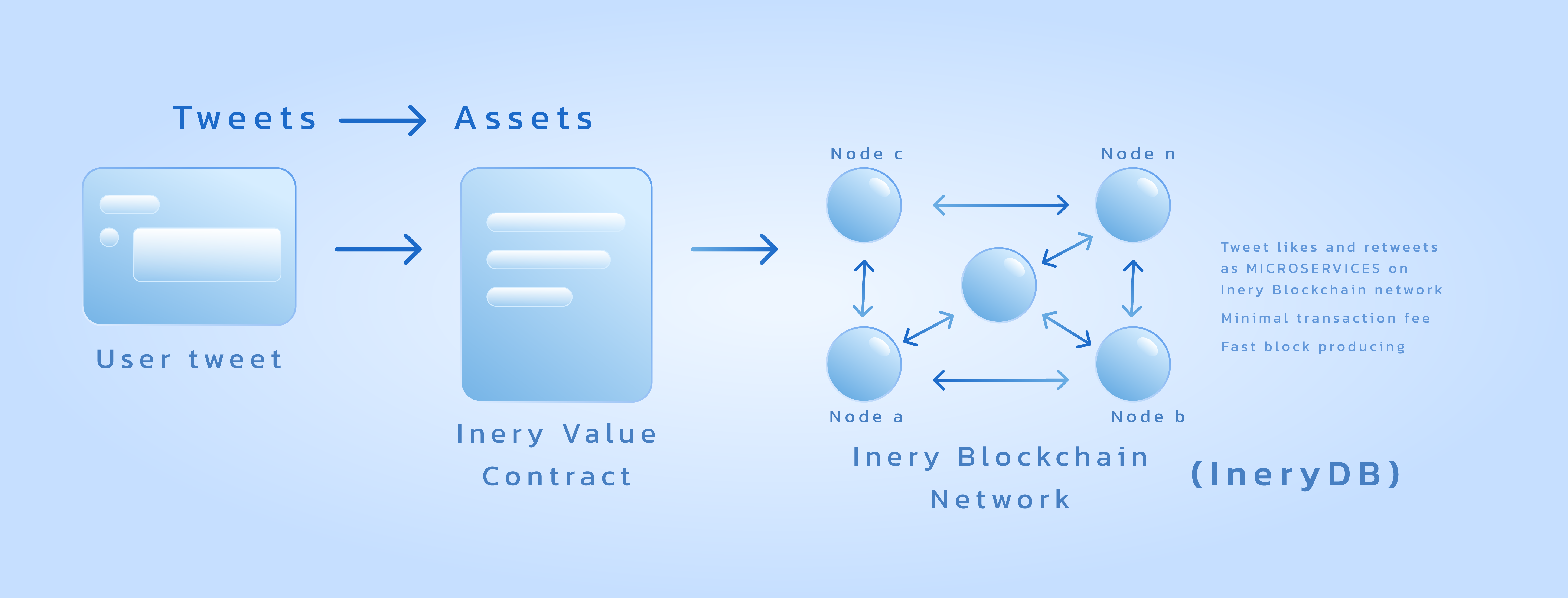
In addition to providing users with greater control over their content, incorporating the IneryDB into Twitter could also provide users with new opportunities to monetize their tweets. By storing tweets as digital assets on the blockchain, users could potentially sell their tweets as collectibles.
Moreover, incorporating Inery Blockchain into Twitter could also help to address the issue of censorship on the platform. With the current centralized model, Twitter has the power to censor or remove content that it deems inappropriate. However, by using IneryDB, Twitter could create a more decentralized model that would make it more difficult to censor or remove content. Since the content would be stored on the blockchain, it would be immutable and resistant to censorship.
In conclusion, incorporating IneryDB into Twitter as a means of storing tweets as digital assets has the potential to revolutionize the way we interact with social media.
It would provide users with greater control over their content, new opportunities to monetize their tweets, and could help to address the issue of censorship on the platform. While there are certainly challenges to overcome, this idea represents an exciting new direction for the future of social media.
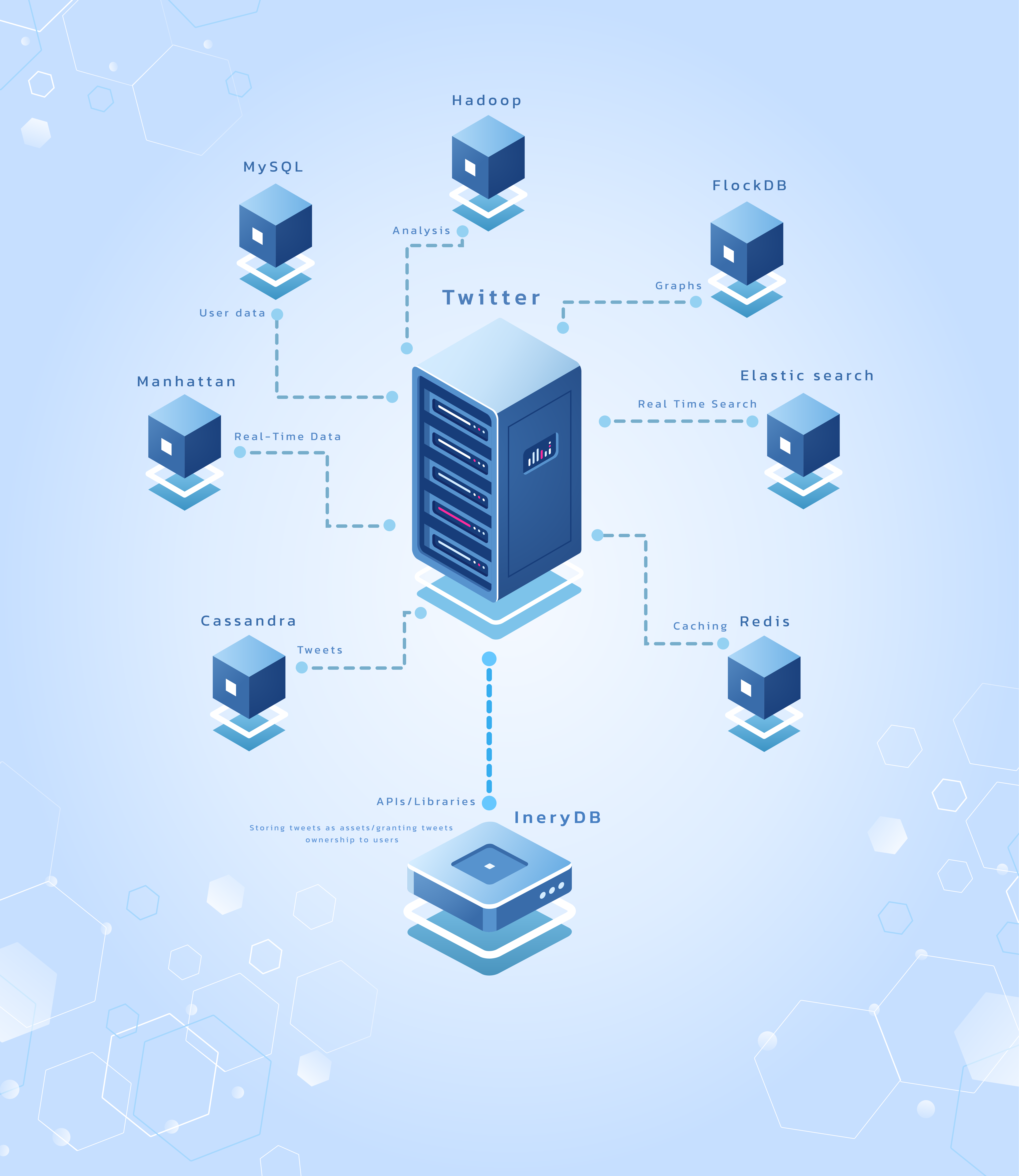
The Technical Aspect
Tables:
Tweets - This table will store the digital assets for each tweet and their associated metadata such as the user account, content, likes, retweets, and timestamp.
Fields:
asset_id: the unique identifier for each tweet digital asset
user_account: the Twitter user account associated with the tweet
content: the text content of the tweet
likes: the number of likes received by the tweet
retweets: the number of retweets received by the tweet
timestamp: the time when the tweet was created
Users - This table will store information about each Twitter user such as their user account and the total number of tweets they have created.
Fields:
user_account: the unique identifier for each Twitter user
tweet_count: the total number of tweets created by the user
Actions:
addtweet(asset_id, user_account, content) - This action will create a new digital asset for a tweet and add it to the Tweets table. The asset_id will be generated automatically by the smart contract.
Parameters:
asset_id: the unique identifier for the tweet digital asset
user_account: the Twitter user account associated with the tweet
content: the text content of the tweet
createuser(user_account) - This action will create a new entry in the Users table for a Twitter user.
Parameters:
user_account: the unique identifier for the Twitter user
updatetweet(asset_id, user_account, content, likes, retweets, timestamp) - This action will update the metadata associated with a tweet digital asset in the Tweets table.
Parameters:
asset_id: the unique identifier for the tweet digital asset
user_account: the Twitter user account associated with the tweet
content: the updated text content of the tweet
likes: the updated number of likes received by the tweet
retweets: the updated number of retweets received by the tweet
timestamp: the time when the tweet was updated
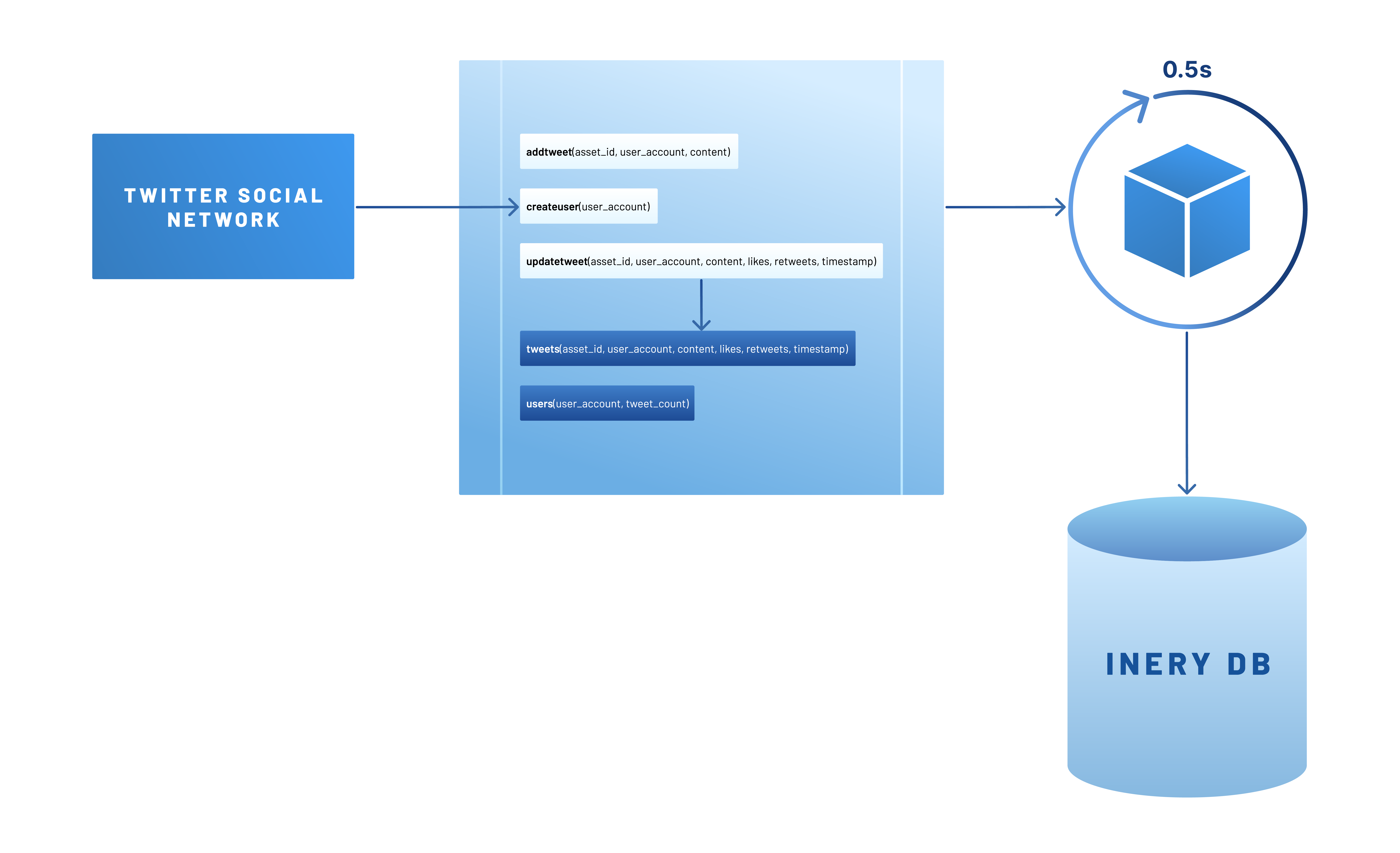 To store tweets using these actions, first the createuser action should be called to create a new entry in the Users table for each Twitter user. Then, the addtweet action should be called for each new tweet, which will create a new digital asset for the tweet in the Tweets table.
To store tweets using these actions, first the createuser action should be called to create a new entry in the Users table for each Twitter user. Then, the addtweet action should be called for each new tweet, which will create a new digital asset for the tweet in the Tweets table.
Finally, the updatetweet action should be called to update the metadata associated with a tweet digital asset whenever a tweet is liked, retweeted, or modified.
Since IneryDB provides fast block creation and low fees, the Tweets table can be frequently updated to store likes and retweets as microservices. This will enable efficient data storage and retrieval, as well as easy integration with other services and applications.

Inery•
2 years ago
Introducing IneryDB GUI: The Future of Database Management
Experience the cutting-edge IneryDB GUI, a revolutionary graphical interface that takes your data management to new heights. Built on proprietary blockchain technology, it offers ultimate control and scalability, empowering a new era of data management. ...READ MORE
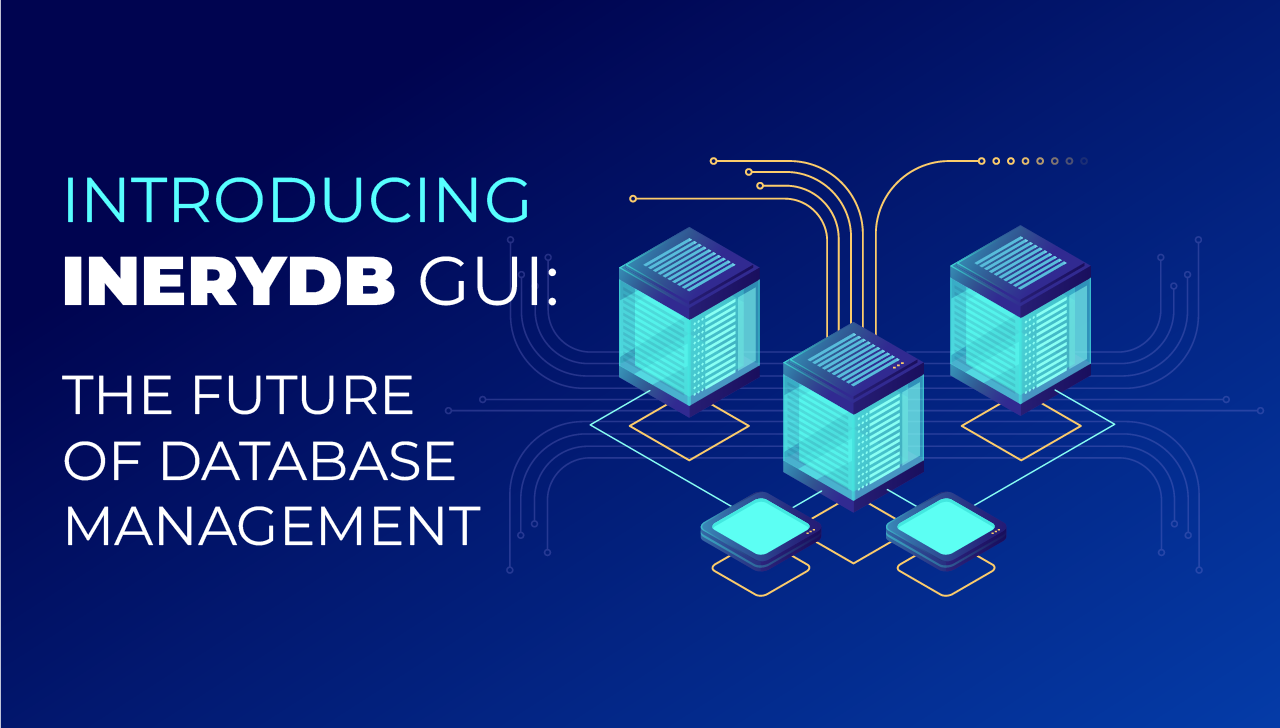
Share

Inery•
10 months ago
Inery Roadmap 2025: What We’ve Building Together
Discover what’s next for Inery in 2025. From smarter data tools to seamless integrations, here’s how we’re building a better way to manage data, together with the community. ...READ MORE

Share

Inery•
11 months ago
Buying a House? Here’s How to Protect Your Contracts and Data
Protect your property deals in a world where digital fraud is on the rise. Find out how you can secure contracts, verify ownership, and guard personal information using modern solutions. ...READ MORE

Share

Inery•
1 year ago
Data Sovereignty: Why It Matters and How Blockchain Can Help
Explore the profound impact of data sovereignty on privacy, security, and global data governance, and discover how blockchain technology offers innovative solutions to these challenges. ...READ MORE
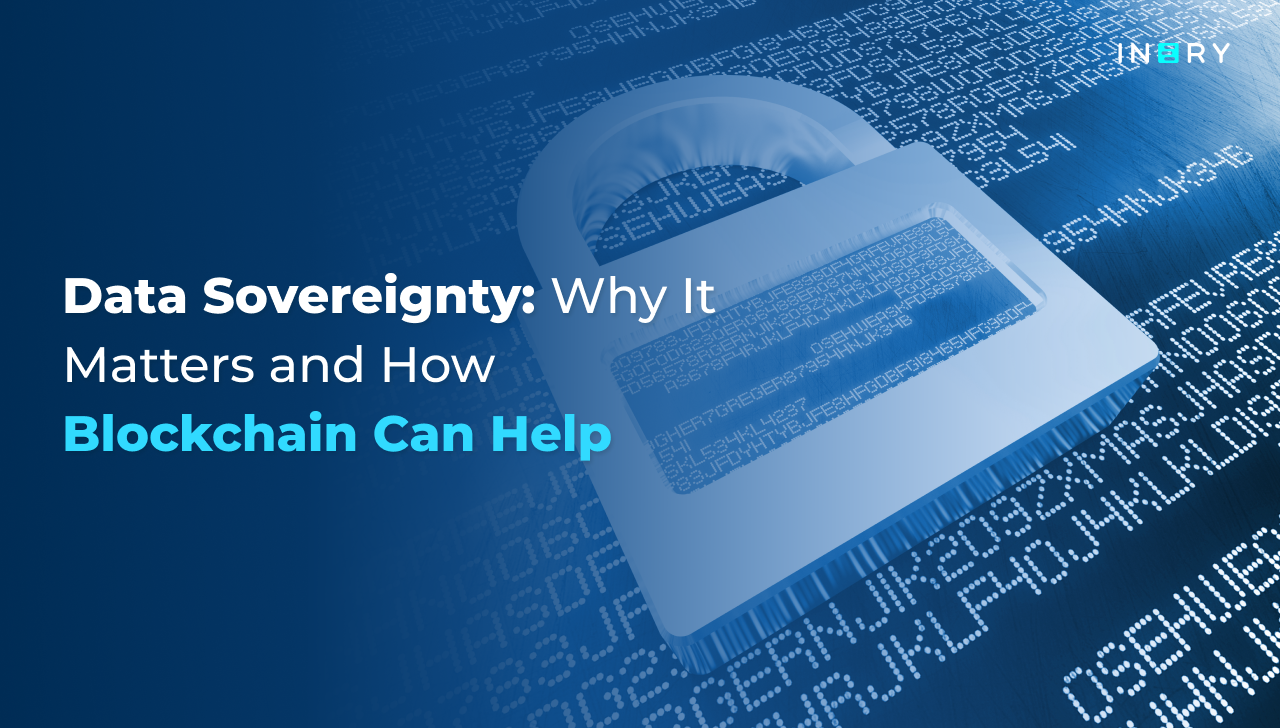
Share
Most popular today

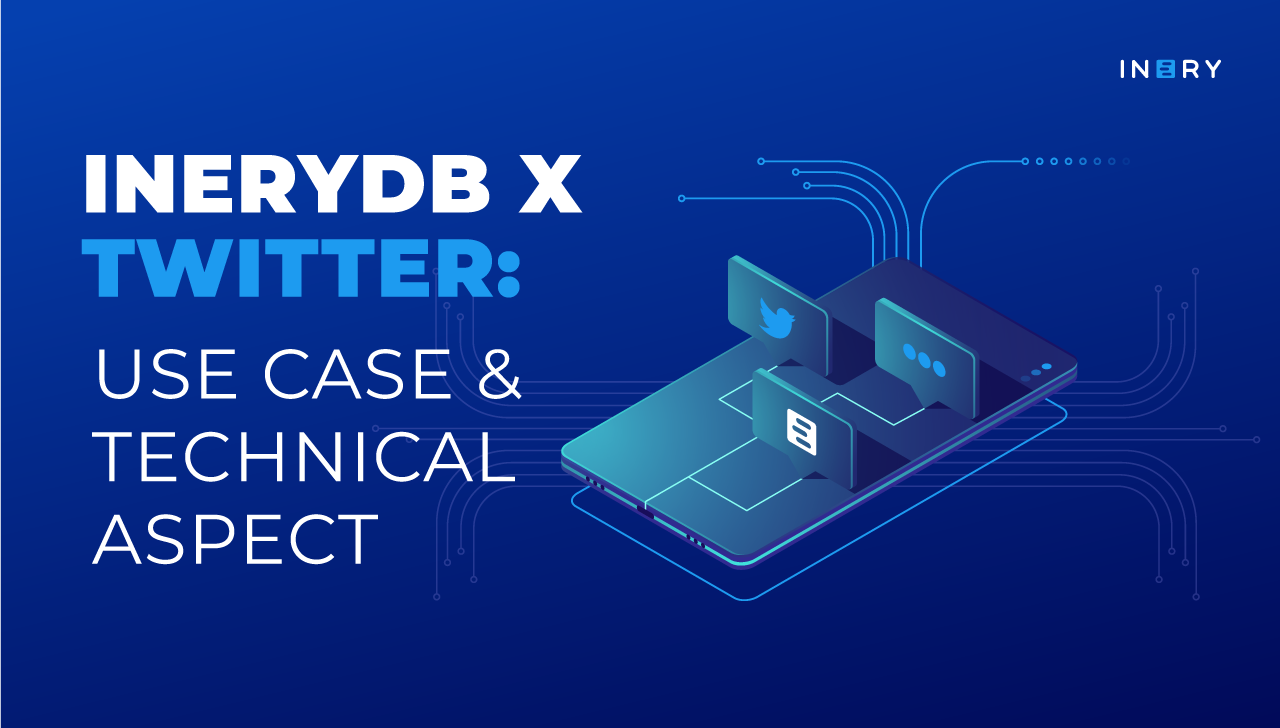
-1735212137.jpg)
-1721906313.png)